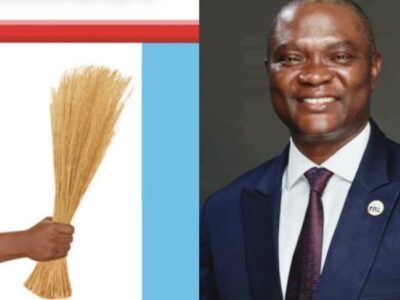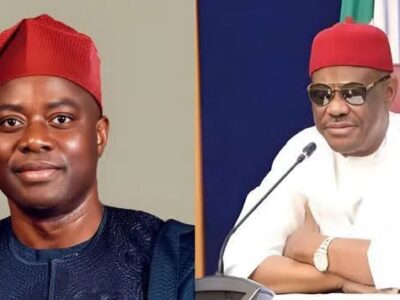A chieftain of the All Progressive Congress (APC) Ambassador (Dr) Ibrahim Tajudeen Olesin has urged President Bola Ahmed Tinubu to jettison the pieces of advice from some quarters including the International Monetary Fund (IMF) to remove electricity subsidy said the action will compound the suffering of the poor masses and may lead to serious chaos in the country.
Recalled that the IMF in its report entitled ‘IMF Executive Board Concludes Post Financing Assessment with Nigeria,’ the IMF reiterated the importance of eliminating the subsidies to redirect resources towards more targeted and impactful social welfare programmes.
“Temporary and targeted support to the most vulnerable in the form of social transfers is needed, given the ongoing cost-of-living crisis. Fuel and electricity subsidies are costly, do not reach those that most need government support, and should be phased out completely,” it said.
Similarly, the Minister of Power, Adebayo Adelabu, hinted about removal of subsidy, according to him Nigeria must begin to move towards a cost-effective tariff model, as he revealed that the country was currently indebted to the tune of N1.3tn to electricity-generating companies, while the debt to gas companies was $1.3bn.
“Very difficult to sustain subsidy on electricity”
Advising President Bola Ahmed Tinubu in the open letter, Ambassador (Dr) Ibrahim Tajudeen Olesin said “removing subsidies on electricity will place an unbearable burden on the already strained finances of ordinary Nigerians.
The letter reads “In the labyrinth of Nigeria’s socio-economic landscape, one persistent shadow looms large: the chronic electricity crisis.
“For decades, the nation has grappled with a glaring deficit in power supply, a challenge that continues to stifle economic growth, undermine social development, and frustrate the aspirations of millions of Nigerians.
“The roots of Nigeria’s electricity woes run deep, intertwined with a complex web of systemic issues ranging from corruption and mismanagement to inadequate infrastructure and policy inconsistency.
“Despite periodic promises and efforts by successive administrations to address this crisis, the situation remains dire, casting a pall of uncertainty over the country’s prospects.
And just a few days back, what seems to be the final nail on the coffin was suggested or rather confirmed by the Minister of Power, Adebayo Adelabu.
“It was an idea he had been toying around with for quite some time but nonetheless found the present time when the nation is bleeding to cut deeper into an already festering wound.
At a media parley, he all but told the people of Nigeria that it was no longer possible for government to subsidize electricity for Nigerians.
“Citing growing debt and the depreciation of the Naira, the Oyo born banker turned Minister of power assured that there was no other option but to bring down the hammer on the heads of Nigerians.
“Nigeria was indebted not to the people but to electricity generating companies and gas producers to the tune of N3.3tn Naira.
“As with the explanation of why subsidy had to go in the petroleum sector, the nation can no longer ease the pain of the majority at the expense of a minority whose profligacy it was in the first place that crippled the sector.
“To sell or rather impose this he said Nigeria must ‘’begin to move towards a cost-effective tariff model’’ which in lay man’s term means that Nigerians will pay more for electricity.
“The suggestion, while ostensibly aimed at addressing financial woes in the power sector, threatens to unleash a wave of chaos and instability across the nation.
Here’s why:
“First and foremost, removing subsidies on electricity will place an unbearable burden on the already strained finances of ordinary Nigerians.
“In a country where a significant portion of the population lives below the poverty line, any increase in utility costs will directly impact the ability of families to afford basic necessities.
With stagnant wages and rising inflation, the prospect of higher electricity bills is simply untenable for millions of households.
“Moreover, the timing of such a proposal couldn’t be worse.
“Nigeria is already grappling with a myriad of economic challenges, including high unemployment rates, sluggish growth, and a depreciating currency.
“The removal of electricity subsidies would only serve to exacerbate these issues, further eroding purchasing power and deepening the economic hardship faced by the average citizen.
“Furthermore, the removal of subsidies on electricity is likely to ignite widespread social unrest and civil disobedience.
“Nigerians are already frustrated and disillusioned with the government’s inability to provide essential services, and any further austerity measures are likely to push them to the breaking point.
“If the government has learnt anything from the unpopular and unrealistic policy of subsidy removals, it is that no good comes out from a population that is burdened by the weight of creating an enabling environment for their lives to make any sense.
“Recently, Nigerians took to the streets in Minna and Kano States, not to cheer the government over its magnificent handling of the economy but to sing one song: WE ARE HUNGRY. Hunger is not a good mix on the menu for a people whose very existence revolves around electricity and petrol.
“Sultan of Sokoto puts it mildly when he says the nation is sitting on a keg of gunpowder.
Remove the subsidy on electricity and kaboom that already brewing resentment towards this administration blows up.
“In addition to the social implications, the removal of electricity subsidies threatens to undermine the competitiveness of Nigerian businesses.
“Many industries rely heavily on affordable electricity to power their operations, and any increase in energy costs would eat into their profit margins and hinder their ability to compete both domestically and internationally.
“This could have ripple effects throughout the economy, leading to job losses, business closures, and a further slowdown in economic growth.
“It is time this administration ensures that those who divert funds meant for infrastructure development and modernization projects face the full wrath of the law.
“There must be transparency and accountability in the allocation of resources otherwise we will continue to undermine efforts to reform the sector.
“CBN Governor Yemi Cardoso just revealed to the nation a few days back that a forensic audit exposed a whopping $2.4 billion false overdue forex claim by some unscrupulous Nigerians.
“The information is out there in the open but the action needed to punish those using this means to shortchange the nation is yet to be seen.
“There are people in the ilk of these elements who continue to milk the nation dry in all sectors including the power sector.
“Not a single one of them has been brought to justice rather government believes the people need to be denied subsidy.
“Regarding the tariff structures and revenue collection, it is a well-known fact that despite substantial subsidies, many electricity consumers still struggle to afford the cost of electricity.
“This in itself is responsible for the widespread non-payment experienced which cripples the finances of distribution companies.
We must address this instead of going the easy route of removing subsidies.
“Finally, to break free from this cycle of dependency and dysfunction, Nigeria must pursue comprehensive reforms aimed at addressing the structural deficiencies and systemic barriers that continue to impede progress in the power sector.
“This includes strengthening regulatory oversight, promoting private sector participation, and incentivizing investment in renewable energy technologies.
“Additionally, there is a need for greater transparency and accountability in the management of public resources, with stringent measures in place to curb corruption and ensure that funds earmarked for the power sector are utilized effectively and efficiently.
“Ultimately, resolving Nigeria’s electricity crisis requires a concerted effort from all stakeholders, including government, industry players, civil society organizations, and the international community. Only through sustained commitment, collective action, and visionary leadership can Nigeria hope to illuminate the path towards a brighter, more prosperous future for all its citizens.
“Until then, the specter of power shortages will continue to cast a long shadow over the nation’s aspirations for progress and development.”










Comments